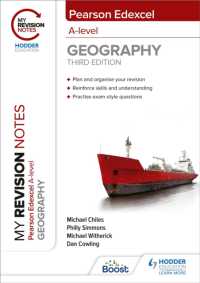Full Description
Laments and complaints are among the most ancient poetical forms and ubiquitous in everyday speech. Understanding plaintive language, however, is often prevented by the resentment and fear it evokes. Lamenting and complaining seems pointless, irreconcilable, and destructive. Language of Ruin and Consumption examines Freud's approaches to lamenting and complaining, the heart of psychoanalytic therapy and theory, and takes them as guidelines for reading key works of the modern canon. The re-negotiation of older--ritual, dramatic, and juridical--forms in Rilke, Wittgenstein, Scholem, Benjamin, and Kafka puts plaintive language in the center of modern individuality and expounds a fundamental dimension of language neglected in theory: reciprocity is at issue in plaintive language.
Language of Ruin and Consumption advocates that a fruitful reception of psychoanalysis in criticism combines the discussion of psychoanalytical concepts with an adaptation of the hermeneutical principle ignored in most philosophical approaches to language, or relegated to mere rhetoric: speech is not only by someone and on something, but also addressed to someone.
Contents
Acknowledgements
List of Abbreviations
Introduction: Getting a Hearing
Consuming Structures of Language
Lamenting in Theory
Terms of Plaint
The Coming Chapters
1. Understanding Plaintive Language: Freud
Complaint without a Cause: Treating Hysteria and Forgetting Laments in Modernity
Complaining and Wish-Fulfillment
Idiom of Plaint: The "Wolf Man's" Speech
Mourning, Melancholia, and Consumption
Metabolism of Plaintive Language
2. Ritual and Modernity: On Silencing Laments (with Aeschylus, Rilke, and Veteranyi)
Tale of Lament's Life and Death
Patterns of Looking at Ritual Plaints
"The Dead Are Hungry": Metaphor and Liminality
Antiphony: Response and Dissent
Ta(l)king Revenge: No End to Lamentation
3. Voicing Pain and Destruction: Wittgenstein and Scholem
Naming and Claiming Pain
Knowing and Doubting Pain
Complaint by Response
A Nasty Move: Silencing Plaints
Relationality and Symbol
Lamenting Tradition
4. Lament of Nature: Benjamin, with Herder
Trauerspiel and Tragedy: "the ear for lament"
Benjamin's "Nature"
Language as Such, and Terminology: Looking Away
Vanishing from History
Lament and Theory, Once Again
5. (No Way) From Complaining to Legal Action: Kafka
"with every complaint understanding [subsides]"
Understanding, Comprehension, Sympathy, and Inconsolability
Complaints, Vanishing into Juridical Action
Representation and Betrayal
Politics of Outcry: Claiming Justice
Conclusion: Transgenerational Trauma and the Inability to Lament
Bibliography
Index







